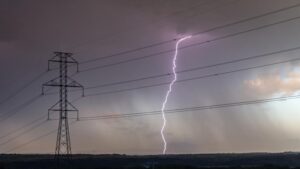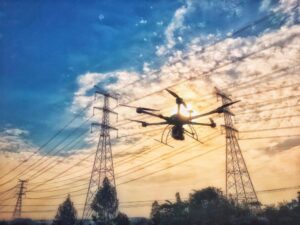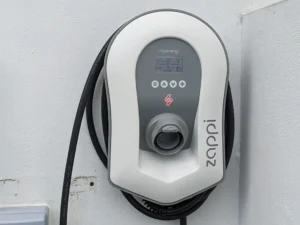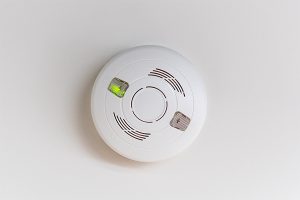Extreme weather conditions can affect power lines and result in power outages. These weather conditions include:
Hot Weather Conditions
- Overheating Power Lines
Power lines can overheat in warm weather the same as with people and animals. The lines are often heavily burdened because of higher power consumption and the power lines which are usually made from aluminium or copper expand when heated. This expansion escalates the slack between transmission line structures, causing them to sag. In the event of a power line sagging or dropping too low and causing it to touch trees or plants, the line can short circuit and shut down as a result. With the power line not being operational, the other lines must carry a higher load. This may cause the by-pass conductors to overload as well and experience the same problem. When the overall consumption expands, so does the power loss due to the heat as well as the volume of “magnetic loss” which is also referred to as reactive power. Power lines and heat is not a desirable combination.

- Increased Energy Consumption
On extremely humid days, everyone is resorting to switching on air conditioning. The sudden high demand in power consumption is drawing down the voltage running through the power lines very quickly. As power is consumed at a fast rate on the heavily loaded power lines, it can’t keep our voltages at their specified levels. When the amount of energy is dropping, so are the voltages. When the voltage levels fall below the point where they are supposed to be, and when power grids can’t produce enough power, blackouts can happen. Renewable sources including solar panels and wind generators plus the national “Smart Grid” effort (modernising the electrical grid by having computerised controls added to it to regulate energy consumption) is creating better opportunities for keeping a declining grid from falling to pieces.
- Lightning
Lightning usually searches for the highest objects to serve as a conductor and often strikes wires, transformers, utility poles and other electrical equipment, causing severe damages which results in loss of power. In other cases, it strikes trees which cause tree limbs and even large trees to collapse onto utility lines.
- Wind
High winds often cause power lines to swing together, bringing about a short circuit or fault that generates a power outage. Tree limbs or trees can be blown into power lines, causing them to fall and severe winds can cause damages to utility poles or result in power lines breaking which initiates a huge blow to significant parts of the infrastructure that delivers electricity.

- Snow And Ice Storms
Winter storms are a significant threat to electrical equipment when the snow and ice builds up on conductors and tree limbs. The weight can result in the wires breaking or causing the tree limbs to break and fall onto the power lines. When these situations occurs we have to concern with the professional electrician to overcome the electrical problem and make our life smooth and easier.
- Rain And Floods
Heavy rainfall and melting snow can be the cause of flooding in certain areas which can lead to extensive damages to both underground and overhead electrical equipment causing power outages.
Contact us today on (08) 9220 5201








